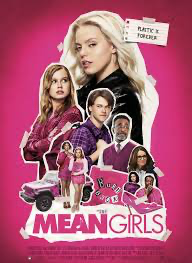
Regina George is back. Mean Girls (2024), portrayed by Reneé Rapp, had the capacity to surpass Mean Girls (2004) in every way. With double the original movie’s budget of eighteen million dollars and a star-studded cast set to play the more recent, musical version, Mean Girls (2024) seemed like it was destined to tower over its older sister. How was the Mean Girls movie musical so much more equipped than Mean Girls (2004), and yet so underperforming as to make only half of the original earnings at the box office?
There are a lot of things that the media has picked apart regarding Mean Girls (2024). However, there were still some things that the 2024 version improved on significantly from the original. For one, Reneé Rapp is an incredible actor. She and the other plastics, played by Avantika Vandanapu and Bebe Wood, do a fantastic job of portraying the characters we have all come to know and love. While there is lots of debate regarding the actor who plays Cady (Angourie Rice), her acting abilities were on par with her co-stars, and she had great chemistry with Jenna Fischer and Christopher Brinely, who played Cady’s mom, and the love interest, Aaron Samuels, respectively. The soundtrack is fun and catchy, and it is made canon that Regina George is a lesbian, which was only hinted at in the 2004 version.
Additionally, Mean Girls (2024) was created to appeal to the teens of today, since times have changed. With a higher budget and sponsorships, Mean Girls (2024) was able to create a more accurate portrayal of Regina George, whose family is extremely wealthy. While some people say that the plastic’s outfits are an inaccurate representation of Regina and her posse, the out-of-date clothing seems purposeful. Similar to how the plastics were previously depicted as fake and controlling through their Barbie-like clothing, as well as making the 2004 girls seem older than they were, the plastics of 2024 also use their wardrobe to rule over others. The clothing that the plastics wear is in stark contrast to the rest of the school, showing the viewer that the plastics are in control without having to tell them. As with any blockbuster, there are bound to be controversial opinions.
Mean Girls (2004) was a dramatized representation of teenage girlhood. Mean Girls (2024) was a dramatized Elf commercial. It is no secret that the remake relied heavily on sponsorships to create the movie. This is not so different from any other movie with a bugget this large, as seen with the blatant Chevy product placement in the Barbie movie and varying social media platforms being shown in the Wreck-it-Ralph movies. The difference between the product placement was logic. It makes sense that there would be advertising for a car during a chase scene, as well as a social media brand sponsoring a movie that revolves around video games and the internet. The product placement for the brand Elf in Mean Girls (2024) could have worked if the directors had chosen a different character to promote the product. Instead, the directors chose to make Regina George the face of the Elf brand. While this makes sense from a corporation’s perspective – Regina is the most popular girl in school, and therefore people copy everything she does – from a viewer’s perspective, this choice does not make sense. Because most viewers had already watched the 2004 film, it was largely known that Regina George was extremely wealthy. With this logic, it doesn’t make sense for Regina to be promoting Elf because, while it is still a respectable brand, it is very popular due to its relatively low prices.
Mean Girls (2024) was, at times, an unreliable movie. With questionable acting and unnecessary product placement, it is understandable why many might have been disappointed. However, Mean Girls (2024) was primarily made to profit from the success and nostalgia of the original, and it is difficult not to nitpick the new movie for falling short in nostalgia and 2000’s fun. With all of this aside, Mean Girls was not a bad movie. It was a humorous twist on the classic Mean Girls story and modernized it so that more generations could enjoy hanging out with the plastics. How many times should we remake popular early 2000’s movies and TV shows using nostalgia bait? Well, that limit does not exist.


























